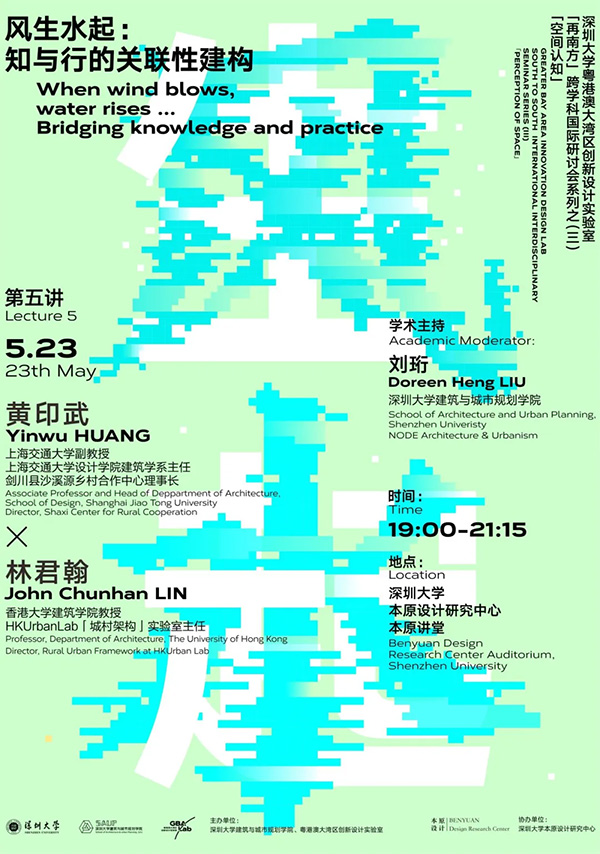
讲座信息:
空间认知 2024
PERCEPTION OF SPACE
深圳大学粤港澳大湾区创新设计实验室
2024「空间认知」 跨学科国际研讨会系列之(三)
第⑤讲
乡土的未来&没有建筑师的建筑:彼时与此时
The Future of the Vernacular & Architecture Without Architects: Then and Now
时间 :2024年5月23日(周四) 19:00 - 21:15
地点 :深圳大学本原讲堂
演讲嘉宾&演讲主题:

黄印武 | Yinwu HUANG
上海交通大学副教授
上海交通大学设计学院建筑学系主任
剑川县沙溪源乡村合作中心理事长
Associate Professor and
Head of Deppartment of Architecture,
School of Design Shanghai Jiao Tong University
Director, Shaxi Center for Rural Cooperation
从2003年起主持沙溪复兴工程,主要从事建筑设计、遗产保护和乡村可持续发展等方面的教学、研究与实践。
Yinwu HUANG has been leading the Shaxi Rehabilitation Project in Yunnan since 2003. His work focuses on teaching, research and practice in architectural design, heritage conservation and sustainable rural development.
/ 演讲题目 /
乡土的未来
The Future of the Vernacular
乡土不仅仅是一个地方,指向一种生活与文化,更是一种精神的寄托。乡土材料的地方性和天然缺陷决定了乡土建造的局限性,工匠经验的试错性决定了传统的根深蒂固。在势不可挡的工业化之中,乡土社会开始瓦解,乡土建筑日渐式微。讲座基于建造视野中的多维度乡土实践,探讨乡土的时代意义,展望乡土的未来。
Vernacular is not only a place, pointing to a life and culture, but also a spiritual sustenance. The localization and natural defects of vernacular materials determine the limitations of vernacular construction, and the trial and error of craftsmen's experience determines the deep-rootedness of tradition. In the midst of unstoppable industrialization, vernacular societies are beginning to disintegrate and vernacular architecture is declining. Based on the multi-dimensional vernacular construction practices, the lecture will discuss the contemporary significance and look into the future of the vernacular.

林君翰 | John Chunhan LIN
香港大学建筑学院教授
HKUrbanLabs「城村架构」实验室主任
Proffessor, Department of Architecture, The University of Hong Kong
Director, Rural Urban Framework at HKUrban Lab
2005 年,当中国政府宣布计划到 2030 年将剩余的 7 亿农村人口中的一半城镇化时,林君翰教授开始关注农村社区的项目,并认识到村庄处于城市化进程的前沿。他与非政府组织、政府机构和其他研究人员合作,共同资助和建设具有社会影响力的项目。
他最近出版的《如是之屋:中国乡村自建房故事(As Found Houses)》一书记录了农村自建房者对其传统住宅进行改造的创新方式。这些案例研究构成了他当前设计和教学的研究背景:尝试将工业和手工艺建筑技术、农村和城市环境、传统和现代生活方式相结合的新方法。他的目标不仅是影响学术界或专业界,而且要积极参与和推动规模更大的日常建筑领域。最近,《如是之屋》 荣获英国皇家建筑师学会(RIBA)2021 年度研究主席奖章。
In 2005 when the Chinese government announced its plan to urbanize half of the remaining 700 million rural citizens by 2030 he began to focus on projects with rural communities, recognizing that the village is at the frontlines of the urbanization process. He works collaboratively with NGOs, government organizations and other researchers to collectively fund and build socially impactful projects.
His recently published book As Found Houses (ORO Editions 2021) documents the unexpectedly innovative ways that rural self-builders adapt, modify, graft, cleave, and wrap their traditional dwellings. These case studies form the research context for his current design and teaching: experimenting with new ways to combine industrial and handicraft building techniques, rural and urban contexts, traditional and contemporary ways of living. His ambition is not only to impact academia or the profession, but to actively participate in and contribute to the vastly larger field of everyday architecture. Recently As Found Houses was awarded the Royal Institute of British Architects (RIBA) President’s Medal for Research 2021.
/ 演讲题目 /
没有建筑师的建筑:彼时与此时
Architecture Without Architects: Then and Now
"未来建筑师的角色是什么?
在政治、技术和环境的变革中,这是值得一问的问题。先入为主的观念正在被颠覆,包括我们对全球化的理解。我们对可持续未来的渴望意味着我们必须更加努力地共同行动起来。当前的全球金融形势要求我们想象出新的方式来资助、开发和建造建筑。面对如此之多的问题和不确定性,我们的建筑行业需要新的关注点——也许是如何重复利用或回收更多的材料、创新的本地材料解决方案、学习乡土的建造方式,以及如何利用最新的制造技术,使其带来更广泛的集体参与。在我们努力应对这些前所未有的新挑战时,也许今天的主要问题不仅仅是建造什么,而是如何建造以及为什么建造。
讲者感兴趣的是我们能从非建筑师那里学到什么,无论是传统的可持续生活方式,还是从自建房者 "无师自通的想象力 "中得到的启发。因为归根结底,如果建筑师要在塑造建成环境的未来议程中发挥作用,我们就需要考虑如何影响大多数并非由我们设计的建筑。
“What is the role of the architect for the future?”
In the midst of political, technological, and environmental transformation, this is the question to ask. Preconceptions are being overturned – including our understanding of globalization. Our desire for a sustainable future means we must work harder at collective action. The current worldwide financial situation demands us to imagine new ways to fund, develop and construct buildings. Faced with so many problems and uncertainties, our construction industry needs new focus – perhaps on how to re-use or recycle more, innovative and local material solutions, ways to learn from vernacular ways of building and how to utilize the latest fabrication technology so it leads to greater collective engagement. As we grapple with these unprecedented new challenges, Perhaps the main question today is not only what to build, but how to build and why we build.
The speaker interested in what we can learn from non-architects, either from traditional ways of living sustainably or being inspired by the “un-tutored imagination” of the self-builder. Because ultimately, if architects will have a role in shaping the future agenda of the built environment, we need to consider how to impact the majority of buildings not designed by us.
对谈嘉宾:

朱雄毅 | Xiongyi ZHU
CCDI悉地国际集团副总建筑师
东西影工作室主持建筑师
Deputy Chief Architect, CCDI Group
Principal Architect, Dongxiying Studio
学术主持:

刘珩 | Doreen Heng LIU
深圳大学特聘教授
粤港澳大湾区创新设计实验室主任
南沙原创建筑设计事务所(NODE)创始人,主持建筑师
Distinguished Professor of Shenzhen Univeristy
Director of GBA LabFounder and Principal of NODE Architecture & Urbanism
 版权所有©深圳大学 粤ICP备11018045号-7
版权所有©深圳大学 粤ICP备11018045号-7






 Sitemap
Sitemap




